Sit-at-home: Inside The Killings, Destructions By ‘IPOB Militants’ In Southeast
Residents in Southeast Nigeria narrate tales of sorrow over the killings and destruction of properties perpetrated by separatist militants as they enforced a controversial curfew.
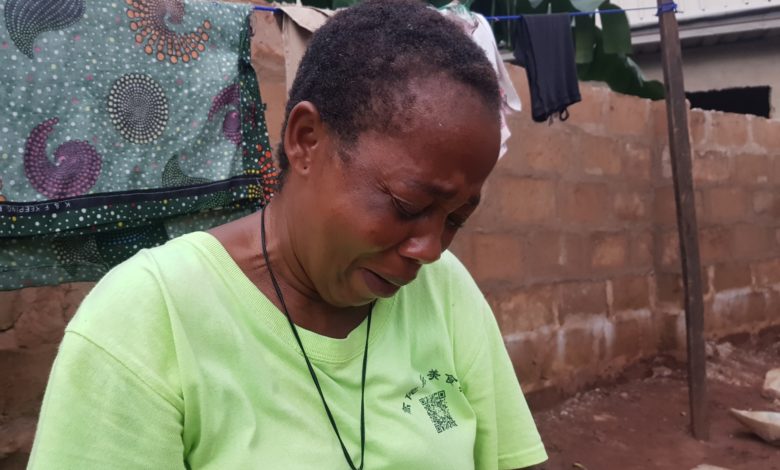
Okolie Ngozi is in her early 50s. She sighed heavily, letting her head drop when our reporter got to her house in Okporo, Imo State, Southeast Nigeria.
“Go,” she said, shaking her head. “I am not ready to speak to anyone. Just go, please.” By the time she completed the sentence, her voice was already fragile and she was on the verge of tears.
Ngozi tried desperately to hide it; she tried to keep her face and her words straight and stern because of her children. Sadly, she could not as tears streamed down her face. She squeezed her eyelids shut in the hope that the tears would stop but her teary eyes remained for quite some time.
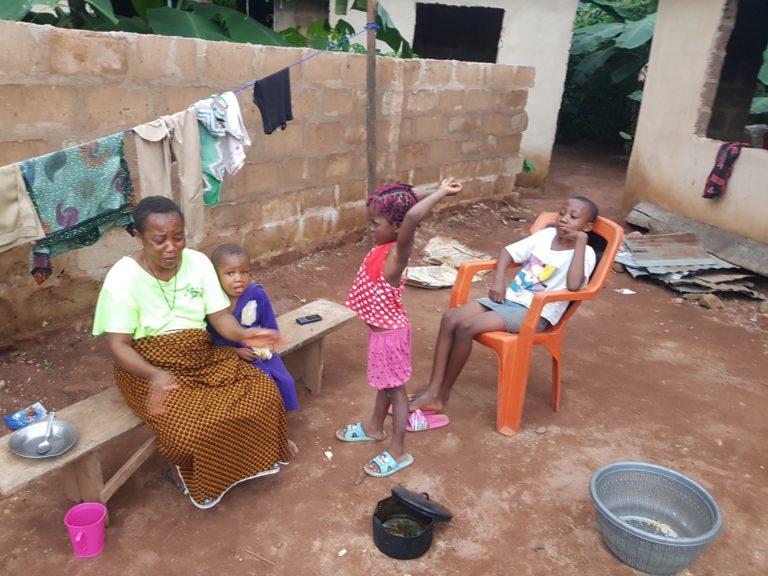
Okolie Ngozi with three out of her six children. Photo: Adejumo Kabir/HumAngle.
Minutes later, she sighed heavily again. “I love Oluwa but they cut his life short for me and his children,” she said, before instructing one of her daughters to bring her father’s obituary poster.
Her husband, Okolie Aloysius, was a mechanic in Okporo, a community in Imo’s Orlu Local Government Area (LGA). He was fondly called “Oluwa” by his family and friends.
Aloysius was shot dead by armed persons who attacked the community on Monday, Aug. 2, 2021. The assailants, who were said to be “IPOB militants,” also destroyed various shops in the community for not obeying their sit-at-home order.
The painful exit
Aloysius got a call from one of his customers to repair a faulty vehicle. He responded but he never returned home alive.
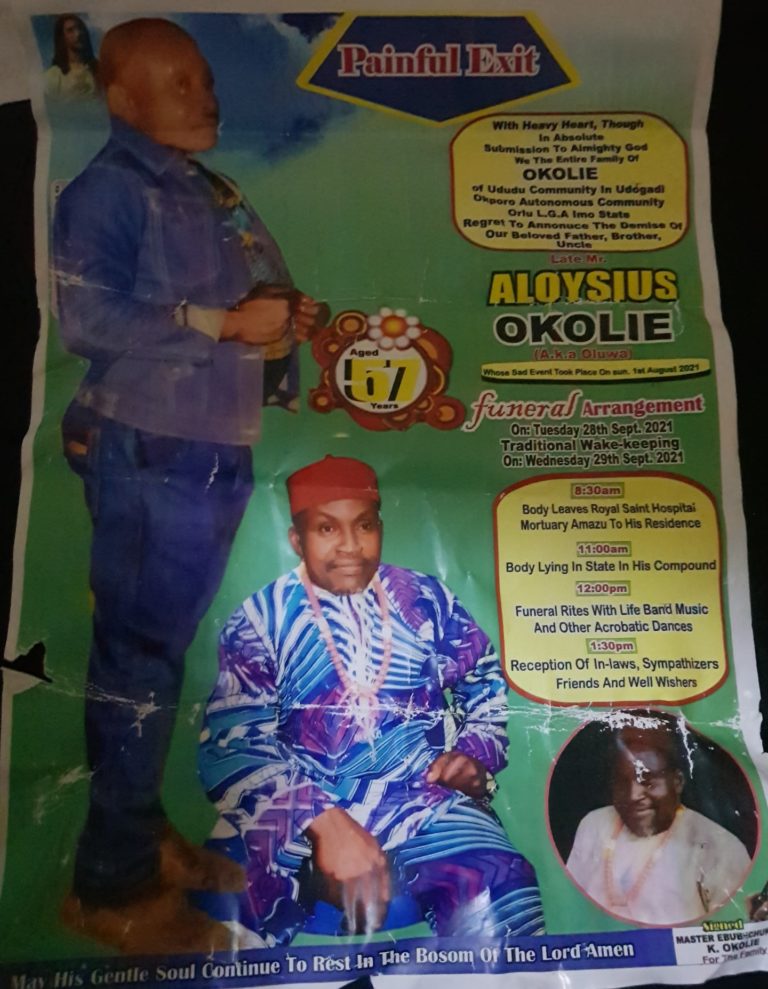
Obituary of Okolie Aloysius killed by “IPOB militants” in Okporo community. Photo: Adejumo Kabir/HumAngle.
He was accosted by armed persons terrorising the community under the banner of the Indigenous People of Biafra (IPOB). Since then, his family members have been faced with various forms of economic and emotional challenges.
“My husband went to his workshop to attend to a customer so that he could make money for the family. Before his return, armed men had already invaded the community. They claimed we didn’t obey sit-at-home orders and were betrayers.”
“Oluwa heard the news of the invasion and was rushing home to protect us. He had hearing challenges. So, he could not hear them well when they were shouting surrender. He was rushing down home to be sure that myself and the children were okay but they shot him and ran away,” Ngozi told HumAngle.
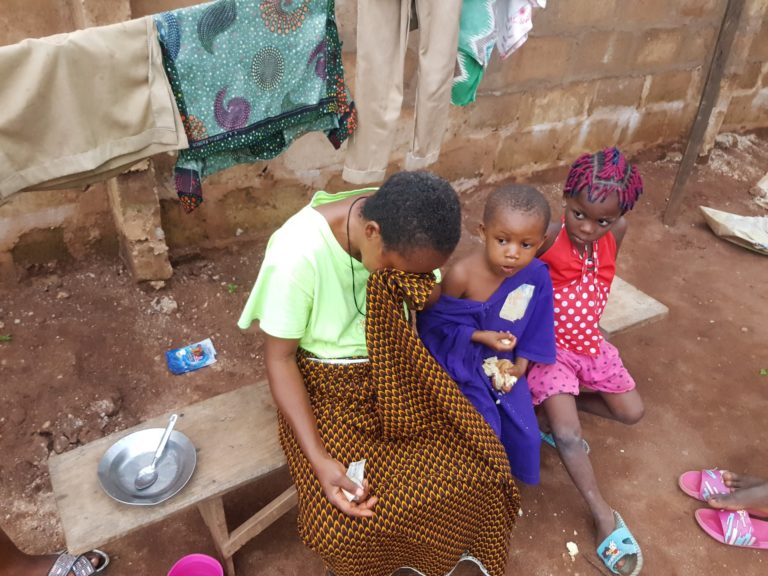
Okolie Ngozi cleaning her tears. Photo: Adejumo Kabir/HumAngle.
“I have been crying since then. He died trying to ensure the safety of his family. I have five girls and a boy, making six children for him. The oldest person is in senior secondary three (SS3) and now his death came up. Who will help me take care of these children?” she sobbed again.
HumAngle learnt that the killers, on the same day that Okolie was murdered, razed over 20 shops as well as vehicles numbering more than 10 in the community.
What does IPOB want?
The aim of the separatist organisation, IPOB, is to restore an independent state of Biafra in the Old Eastern Region of Nigeria, comprising current Southeast and South-South regions.
It was founded in 2012 by Nnamdi Kanu, who had spoken at gatherings threatening Nigerian authorities and calling for Biafra’s independence. At various times, he referred to Nigeria as a zoo, urging his loyalists to take up arms against the state.
“We need guns and we need bullets. It’s either Biafra or death,” he said in a 2017 interview.
Kanu was arrested and charged with offences of treasonable felony, unlawful possession of arms, and illegal importation of broadcast equipment at a Federal High Court in Abuja in 2015. He was granted bail on medical grounds in 2017 after spending 18 months in incarceration. He later jumped bail and fled the country, claiming that he feared for his life after security operatives raided his home in a standoff that left some people dead.
Almost four years later, Kanu was recaptured and he has since June 29 remained in detention.
The sit-at-home order
In response to Kanu’s troubles, a group of pro-Biafra protesters have been leading marches in southeastern parts of Nigeria to push for his release. The group further ordered sit-at-home and asked Igbo residents to observe the curfew in all states of the region.
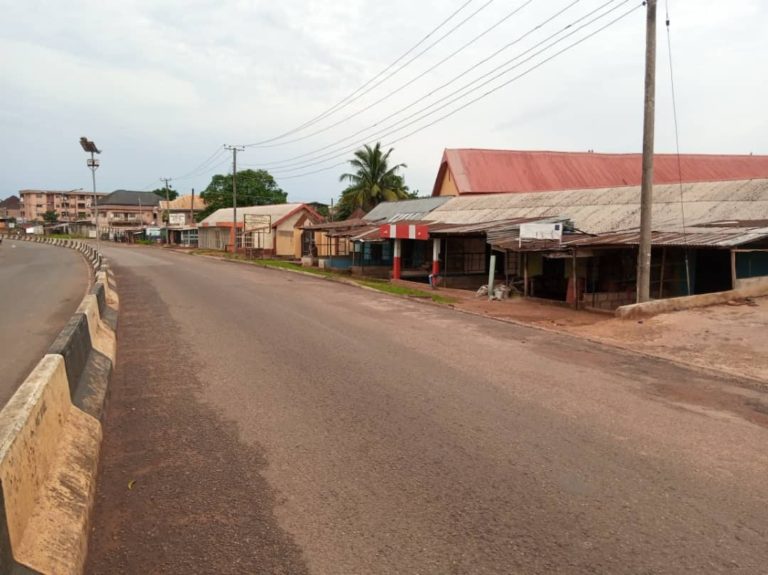
An empty street in compliance with sit-at-home order. Photo: Daily Trust.
Since IPOB began enforcement, Monday has become an unproductive day in the Southeast. There is often a near total compliance with the order apparently because of threats of heavy consequences on violators by IPOB.
In most Igbo communities, markets, schools, banks, motor parks, and even worship centres are shut down as members of the IPOB’s Eastern Security Network (ESN) move around streets.
They frequently have confrontations with constitutionally established security personnel such as soldiers and police officers, often leading to fatalities. The enforcers also have a history of attacking residents who defied the order either by killing them or destroying their businesses.
Horrific killings, destructions
Aside from Okolie whose death has visited hardship on his family members, many other families in the region have lived in sorrow following the killings of their loved ones or injuries inflicted on them by militants.
Patience Andie told HumAngle that her 16-year-old son, Chigozie, was shot dead by IPOB militants while returning from a market in Enugu in July 2021.
“My son was hit by a stray bullet during IPOB’s confrontation with the police. The day remained the saddest day of my life,” the frustrated mother said. “I only sent him to the market to help buy food ingredients and he did not return home alive.”
“I am feeling sad that those fighting for self-determination are only hurting us and causing many homes to cry. I am in pain and I want justice for my son. The world should help me,” Patience cried.
HumAngle reported how a series of the attacks linked to IPOB militants killed several police officers and led to the razing of police facilities in Southeast and South-south Nigeria.
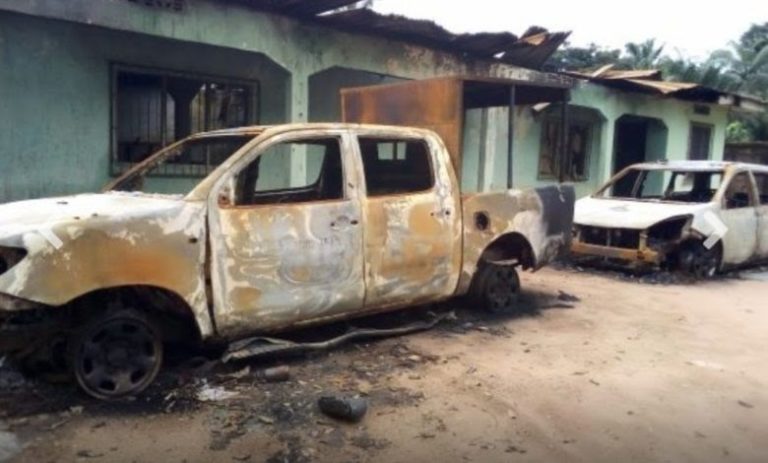
Destroyed vehicles at Ehime Mbano Police Station in Imo State. Photo: Adejumo Kabir/HumAngle.
In the same vein, many public facilities including offices of the electoral commission, INEC, have been attacked across the two regions.
The Nigerian Army in June disclosed that the IPOB’s ESN has killed 128 military and police personnel as well as 15 civil defence officers and 31 community policing members in the Southeast.
The army claimed that the group has also killed over 100 civilians who refused to support its activities.
Meanwhile, Amnesty International likewise said over 100 persons have been killed by security officers between Jan. and June 2021 in Imo, Anambra, and Abia states, in response to the activities of the separatist militia.
A passenger was burnt alive in Nkwogu, Ahiazu Mbaise LGA of Imo State, when the sit-at-home order turned bloody on Aug. 9. The bus was coming from Umuahia, Abia state capital, when the passengers ran into members of IPOB. They shot at the tyres, which forced the bus to stop.
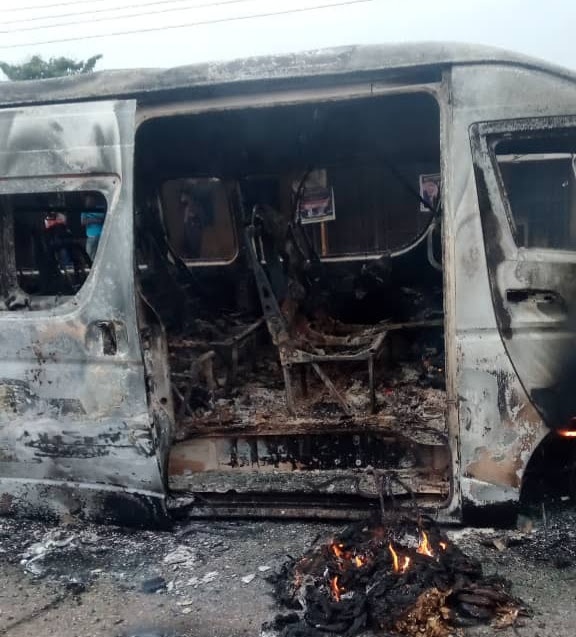
A bus razed by IPOB militants enforcing sit-at-home order. Photo: Adejumo Kabir/HumAngle.
Eyewitnesses in Ohaji/Egbema LGA of Imo told HumAngle during a visit to the area that four oil workers of Lee Engineering Company operating in Assa Community and a police officer attached to the oil company were killed by militants enforcing the order on Aug. 16.
Also, Jonathan Ugochukwu, a community leader from Okporo, was not lucky after IPOB members accused him of being an informant to the security agencies. After shooting him dead, they beheaded him and displayed his head at the Orie Okporo market, to serve as a warning to other ‘saboteurs’.
The killings, HumAngle learnt, have continued to spread across different states in the Southeast region.
More tales of sorrow
In cases where people are not killed, residents’ businesses are often destroyed by enforcers of the sit-at-home order. The militants on several occasions also burnt vehicles conveying travellers in the affected states.
Innocent Chima*, a caskets dealer in Okporo and victim of the Aug. 2 attack, told HumAngle over 200 caskets were burnt during the incident.
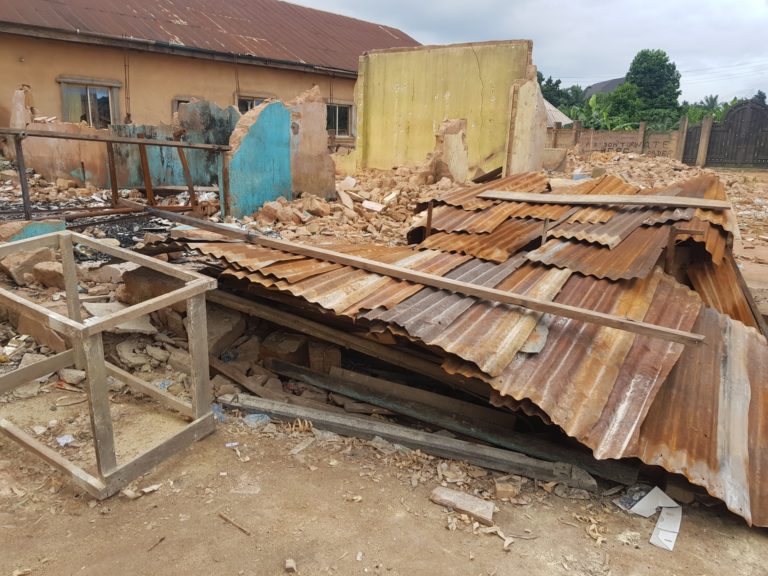
The casket shop destroyed by IPOB militants. Photo: Adejumo Kabir/HumAngle.
“It was not a joyful experience I had with the armed men. This is Okporo casket line and all we do is make caskets for families of dead people. We were working on Monday morning when we saw two vehicles loaded with armed men and we scampered for safety. They started shooting sporadically and that was when they killed Oluwa (Okolie Aloysius).
“They set my shop and many others on fire. I lost over N500,000 cash in the shop and I had over 200 caskets burnt during the invasion. It was a sad experience for me and other affected people. They got three motorcycles and four vehicles burnt. They went to the hotel adjacent to my shop and also burnt the place.”
The affected hotel, Ezeacho Hotel, was under lock when HumAngle visited to observe the damage but three burnt vehicles were seen at the scene.
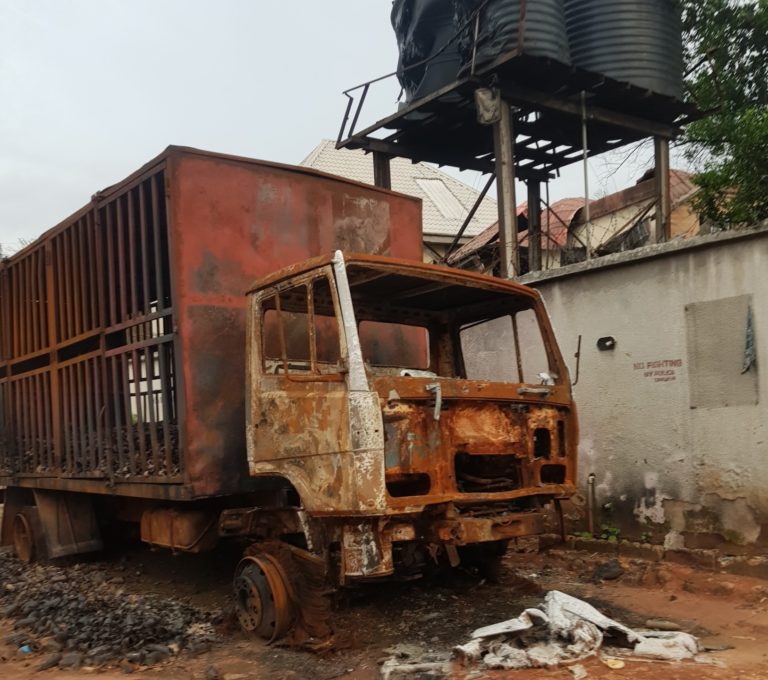
One of the vehicles burnt at the hotel attacked in Orlu LGA. Photo: Adejumo Kabir/HumAngle.
Another victim, Felix Undukwe, got a Mazda bus on hire purchase for the sum of N4 million in Jan. 2021. He was using the vehicle to ply Owerri in Imo to Onitsha in Anambra State.
Felix had only paid N1.7 million before he was attacked by IPOB militants who set the vehicle ablaze on Aug. 22 for not obeying the sit-at-home order. They attacked the vehicle at Orlu LGA as passengers escaped through the bush.
“I took my 18-passenger bus from Owerri around 7 a.m. and we were heading to Onitsha. We encountered some youths when we got to Orlu. They asked if we weren’t aware of the sit-at-home order. Before I responded, they were already pouring petrol on the vehicle.
“Myself and the passengers swiftly opened the doors and ran into the bush for safety. No one took his or her luggage from the vehicle because we were all scared of death. They set the vehicle ablaze immediately.”
Felix said he called the man who bought the vehicle for him after the attack and he insisted he paid the balance of N2.3 million.
“After taking my family to his house to beg, he said I should go and look for N1 million so he would forget the rest. I have been finding life difficult since the incident occurred. I now work as a bus conductor and sometimes come back home with N2,000 or N1,500 to feed my wife and five children,” he narrated to HumAngle.
Residents live in fear
Despite assurances of safety given to them by the Imo government, residents believe that their lives are in danger. In some communities like Umuna, Omuma, Umutanze, Okporo, Awo-Omama, Owerre Ebeiri, Amaifeke, Eziachi, Umuowa, and Ihioma in Orlu LGA, people have deserted their houses.
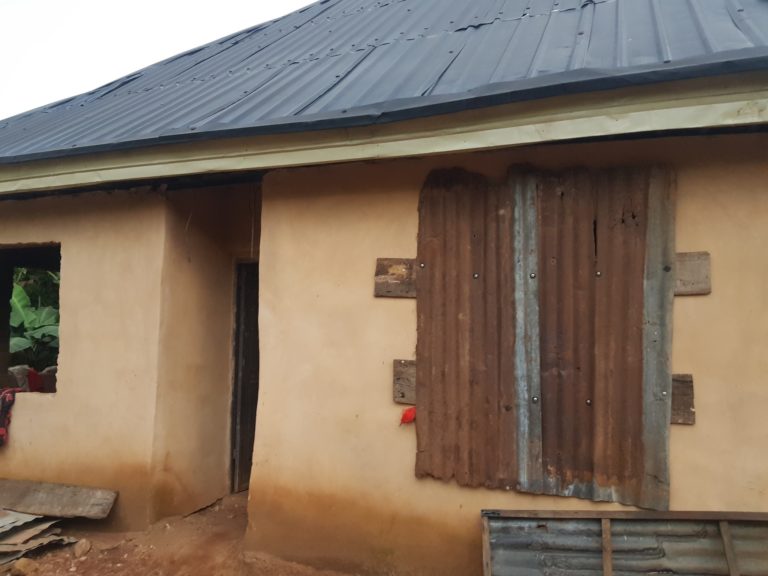
One of the empty houses in Awo-Omama, Imo State. Photo: Adejumo Kabir/HumAngle.
Those who are still in the communities are living in constant fear of either becoming victims of the IPOB militants who are said to be prowling for collaborators or traitors to their cause, or of security agents attacking under the guise of hunting down members of the separatist group.
“Hope you are not one of the boys killing people around o. I hope you will not come to my house and kill us at night because the situation of the community is bad,” Chidinma Arome, a resident who led HumAngle to various scenes of attack, queried our reporter.
She says fear has enveloped Orlu communities since the sit-at-home order began. Chidinma also advised our reporter not to spend the night at the LGA to avoid being a victim.
Residents told HumAngle that the Eze Mkpado of Umuzike, a traditional ruler in Awo, an autonomous community in Orlu, escaped to Lagos for safety after he was accused by IPOB of harbouring herdsmen.
A motorcyclist who spoke under anonymity because he feared getting attacked said most of the distressed residents in various communities hardly sleep at night.
“Once it is nightfall, you will see everybody in their houses. We encourage our loved ones to sleep at their destination once it is 5 p.m. because even on days that we don’t have sit-at-home, IPOB boys and security operatives may have random confrontations.”
“I am preparing to leave the state and move to Lagos because anything can happen. As it is, everybody is a suspect. If IPOB guys don’t accuse you of being a police informant, the police may accuse you of being an IPOB member when they see you walking at night.”
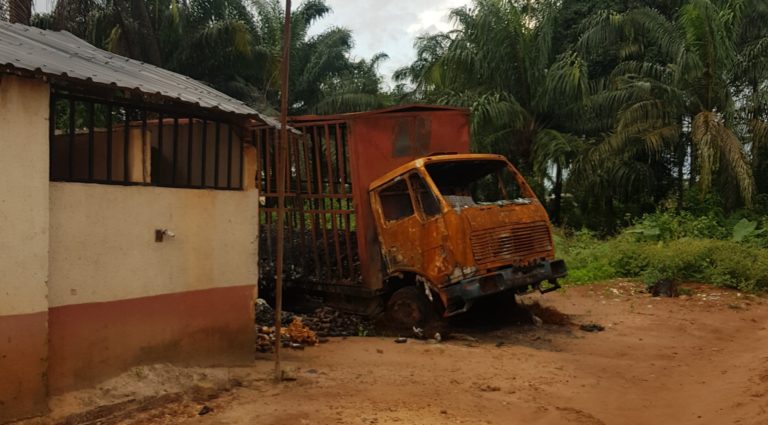
Another vehicle burnt at the hotel attacked in Orlu LGA. Photo: Adejumo Kabir/HumAngle.
‘We are not relenting’ – IPOB members
Southeast leaders, including governors, other political, religious, traditional and socio-cultural leaders, in June 2021 had a meeting in Enugu where they condemned secessionist agitations as well as wanton attacks on security formations and other national assets.
Similarly, the leadership of the Women Wing of Ohanaeze Ndigbo expressed dismay over the killings, alarming state of insecurity, and threat to lives in the region. They called on the government to arrest the ugly situation before it gets out of hand.
Another group known as the Coalition of South-East Youth Leaders (COSEYL), the apex socio-political youth group in the southeast geo-political zone also condemned the invasion of communities by IPOB militants.
Following public outrage, IPOB spokesperson, Emma Powerful, on Aug. 14 announced that the group was suspending the weekly sit-at-home exercise. HumAngle’s findings, however, proved otherwise as killings and destruction of properties continue.
A taxi driver who drove our reporter from Douglas in Owerri to Okporo in Orlu said “those saying we have suspended sit-at-home are traitors. The protest will continue until they (government) release Nnamdi Kanu. Arresting Kanu is illegal. All we want is the truth and the truth is the Biafra nation.”
A co-passenger, who confirmed being a member of IPOB, stressed that they would not relent in enforcing the sit-at-home order in the state.
Hinting that the crisis may not de-escalate soon, IPOB’s spokesman Powerful, recently threatened that there would be total lockdown in the Southeast if Kanu is not produced for his next court appearance slated for Oct. 21, 2021.
“If the federal government refuses to bring him to court in his next court appearance… the entire Biafra land will be on total lock down for one month. The federal government will know that they cannot take us for granted anymore.”
Residents move to tackle IPOB members
IPOB is unarguably supported by many Igbos, who also want Kanu released. While many of them believe that they are highly marginalised and IPOB is right to agitate, they do not support the brutal approach adopted by the agitators.
Those residing in Imo, particularly in the Orlu and Owerri metropolis where the killings are more rampant, told HumAngle that they are tired of the invasion of their communities and churches by IPOB and security officials in search of “Biafra boys”.
One resident said, “The raids often end in loss of lives, destruction and arrest of innocent citizens. We can no longer tolerate losing millions to some thugs in the name of IPOB.”
To further express their displeasure against the destruction of businesses, a 34-year-old man who was said to be an IPOB leader, Obinwanne Iwu, was beaten to death by angry youths in Ahiazu Mbaise LGA of Imo on Sept. 20 while trying to enforce the sit-at-home order at a market alongside his gang members.
Govts’ reaction to sit-at-home order
Although some state governments have kicked against the sit-at-home order, IPOB militants appear to be more respected in the region than constituted authorities.
Governor Hope Uzodinma of Imo, for instance, said in Aug. 2021 that “there is only one governor in the state and only the governor can issue a sit-at-home order and it will be obeyed.”
Despite this, IPOB militants continue to enforce the controversial order. Also, Anambra State Governor, Willie Obiano, warned against obeying the order but residents have repeatedly defied his instruction.
Governor of Ebonyi State, David Umahi, ordered the immediate confiscation of shops owned by traders obeying the sit-at-home order. He equally ordered the immediate sacking of civil servants who failed to show up at work on Mondays.
In contrast, since it arrested Kanu, the federal government has not shown that it worried about happenings in the southeast region.
HumAngle contacted the Attorney-General of the Federation, Abubakar Malami, for comment but he did not respond to calls and text messages.
A resident, Felicia Nwakete, said the federal government has left them to their fate because “the Southeast region is not Abuja or Lagos or even Niger Delta that are the nerves of Nigeria.”
“I don’t even know who to blame between IPOB and the government,” she added. “The IPOB boys said, with or without Kanu, they will realise their Biafra dream. Why are they killing and destroying our people’s properties? IPOB cannot say they cancel sit-at-home and some individuals whom we know as their core members will continue to punish residents who go out to carry out their daily activities.”
Residents also believe that regular observation of the sit-at-home order is not a sacrifice for the actualisation of Biafra but a direct way of killing the region’s economy as business owners are fast considering other regions.
“If the IPOB boys truly love us, they should not take any action that will kill us or hurt our businesses,” Felicia appealed.

